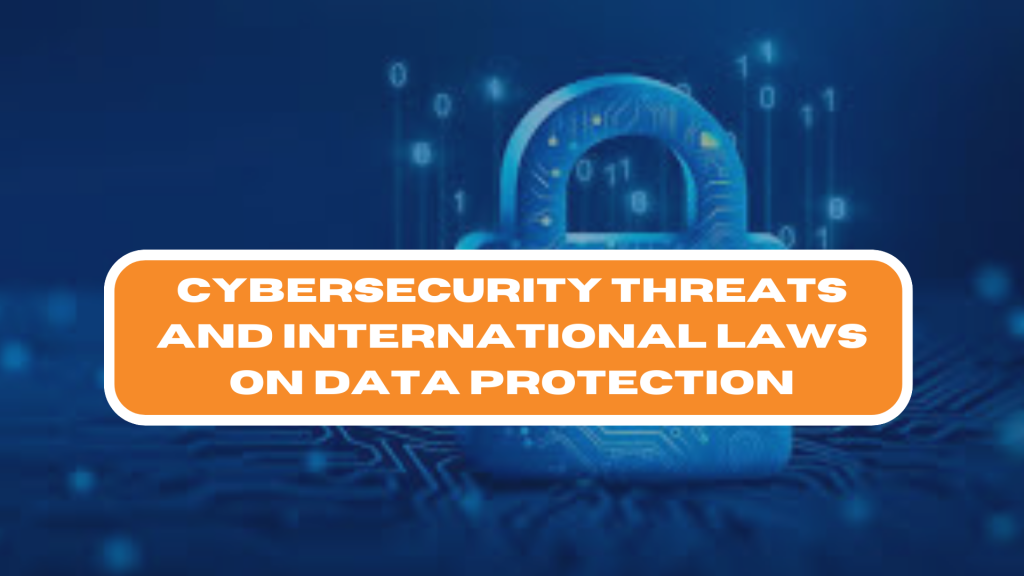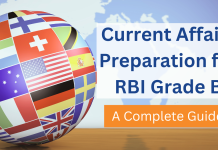In today’s fast-paced digital age, where technology is seamlessly woven into our daily lives, cybersecurity has become more than just a buzzword. From online transactions and social media interactions to educational resources and competitive exam preparations, our dependence on digital platforms is undeniable. However, with this digital convenience comes a looming threat—cybersecurity threats that can compromise personal data, disrupt systems, and even impact national security.
As a student preparing for competitive exams, understanding cybersecurity threats and international data protection laws is not only crucial for exams but also vital for safeguarding your own digital footprint. In this article, we will explore the types of cybersecurity threats, the importance of data protection, and how international laws aim to create a safer digital world.

The Growing Landscape of Cybersecurity Threats
Imagine waking up one day to find your email hacked, your bank account drained, or your study materials deleted from your cloud storage. While this sounds terrifying, it is a reality for many. Cybersecurity threats have become increasingly sophisticated, targeting individuals, organizations, and even governments. Some common cybersecurity threats include:
- Phishing Attacks: These involve deceptive emails or messages that trick individuals into sharing sensitive information, such as passwords or financial details.
- Ransomware: Malicious software that locks users out of their systems or encrypts data, demanding a ransom for access restoration.
- Malware: Software designed to harm or exploit devices, networks, or services. It can be introduced through infected downloads or malicious links.
- Data Breaches: Unauthorized access to confidential data, which can result in the misuse of personal or financial information.
- Distributed Denial of Service (DDoS) Attacks: These attacks overwhelm systems with traffic, causing websites or online services to crash.
International Laws on Data Protection
With rising cybersecurity threats, countries worldwide have implemented robust data protection laws to safeguard citizens’ information. Some prominent international frameworks include:
- General Data Protection Regulation (GDPR): Enforced by the European Union, GDPR is one of the strictest data protection laws globally. It grants individuals control over their personal data and requires organizations to follow stringent data handling practices.
- California Consumer Privacy Act (CCPA): A U.S.-based regulation that gives consumers greater transparency and control over how their data is collected and used by businesses.
- Personal Data Protection Bill, India: India is also strengthening its data protection framework with proposed legislation focusing on individual rights, data localization, and accountability of data handlers.
- Convention on Cybercrime (Budapest Convention): An international treaty that facilitates cooperation among countries in fighting cybercrimes through standardized legal frameworks.
These laws aim to create a safer digital environment by enforcing data privacy, regulating cross-border data transfers, and establishing penalties for data breaches. As an aspirant, familiarity with these laws can enhance your answers in exams, particularly in sections like current affairs, legal studies, or IT-related domains.
Connecting the Dots: How Does This Impact You as an Aspirant?
Competitive exams often assess not just your knowledge but also your analytical thinking and real-world awareness. Questions related to cybersecurity threats or data protection laws might appear in multiple-choice sections, descriptive essays, or interview rounds. For instance:
- General Awareness Section: You might encounter questions about recent cybersecurity breaches, international data protection laws, or major regulatory changes in India.
- Essay or Descriptive Writing: You could be asked to write about the impact of digitalization on privacy, the need for cybersecurity in the public sector, or analyze global responses to cyber threats.
- Interviews and Group Discussions: Your ability to discuss data protection laws or provide insights into recent cyber-attacks could set you apart from other candidates.
Practical Tips for Students: Protecting Your Own Digital Space
While preparing for exams, your focus might primarily be on books, notes, and mock tests. However, taking steps to secure your digital environment is equally important:
- Use Strong Passwords: Avoid using easily guessable passwords like “12345” or “password.” Use a mix of letters, numbers, and symbols.
- Enable Two-Factor Authentication (2FA): Adding an extra layer of security to your accounts can prevent unauthorized access.
- Be Wary of Phishing: Avoid clicking on suspicious links or downloading attachments from unknown sources.
- Update Software Regularly: Keeping your apps and devices updated helps protect against security vulnerabilities.
- Backup Your Data: Regularly back up important files to a secure cloud service or an external device to avoid data loss.
By adopting these simple practices, you can create a secure digital space that supports your exam preparation without the risk of cyber disruptions.
Summing Up
As a student preparing for competitive exams, cybersecurity threats and data protection laws may seem like vast and complex topics. However, breaking them down into digestible insights can significantly boost your knowledge and exam readiness. In a world where data is as valuable as currency, understanding how to protect it—and how international laws aim to do so—empowers you both as a learner and as a responsible digital citizen. So, as you immerse yourself in your studies, take a moment to secure your digital world too.
At ixamBee, we specialize in providing comprehensive online courses for government exams and online courses for government jobs. Our expertly designed courses for government jobs cater to a wide range of upcoming government exams. Whether you’re preparing for specific courses for government exams or seeking general guidance, ixamBee offers the resources like Beepedia previous year papers, SSC CGL, SSC CHSL, SSC MTS and other mock tests to succeed in exams like RBI Grade B, SEBI Grade A, NABARD Grade A, RRB NTPC, SSC MTS, NIACL Assistant, and more.
Also Read:
Geopolitical Conflicts and Their Effect on Global Stability
Climate Summits and Global Initiatives Against Climate Change
Global Organizations and Their Functions: UN, IMF, WTO, and WHO















